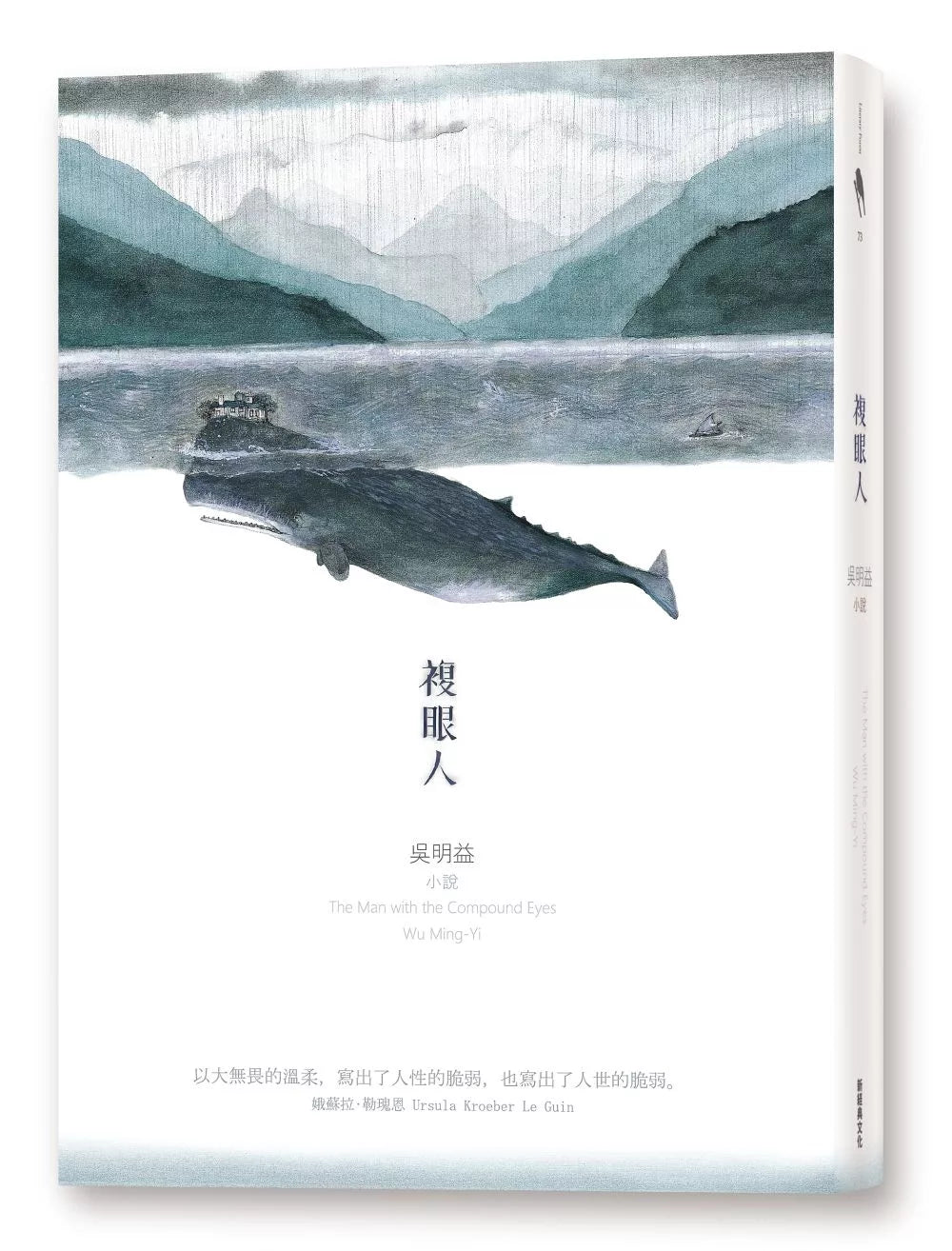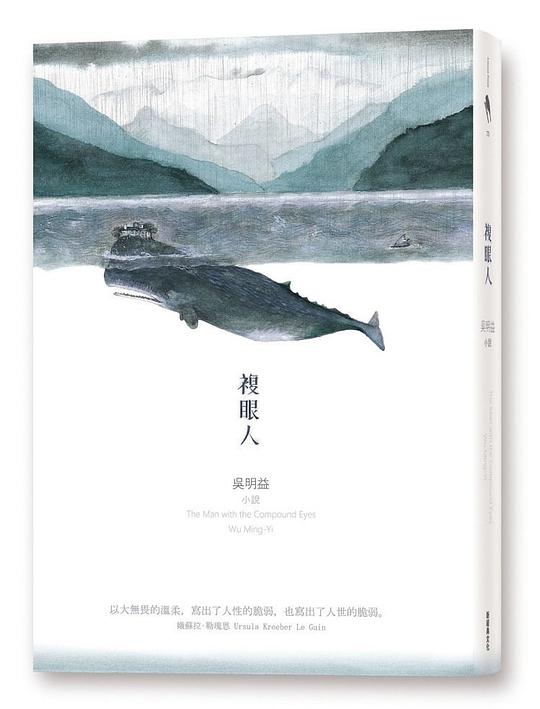1
/
of
2
man with compound eyes
man with compound eyes
Wu Mingyi
Regular price
$21.99 USD
Regular price
Sale price
$21.99 USD
Unit price
/
per
In stock
Couldn't load pickup availability
About Book
About Book
The Man with the Compound Eyes
With fearless tenderness, he writes about the fragility of human nature and the fragility of the world.—Ursula K. Le Guin
2016 New Collector's Edition Wu Mingyi, Zhang Youran, Zheng Jingwen, Wang Lewei, Wang Fusheng, and Jin Yunxuan, with illustrations and commentaries. Special features include: the short story "The Man with Compound Eyes", a special book review from The Guardian, and book covers from various international editions.
2015 Time Out Beijing Best Chinese Novel of the Century 2014 French Prix du Livre Insulare Novel Award
2012 Taipei International Book Fair Novel Award, 2011 China Times Open Book Book of the Year Award, and has sold copyrights in the United States, the United Kingdom, France, China, Turkey, the Czech Republic, Indonesia, Ethiopia, India, Hungary, and other countries.
Such care and patience, eliminating the urgent tone of rescue, seemingly tepidly piling up and laying out the subtle observations and subtle moods of slow-moving cycling, without needing too many adjectives. Such narration and rhythm convey an inherent sense of cherishment and care, which is transmitted to the reader. He does not particularly distinguish between those who should be saved and those who should be hated, narrating them equally and gently, but it is even more able to evoke a feeling of deep sorrow, which lingers for a long time. - Yang Zhao
This is a novel that blends science fiction and fantasy, poetry and sadness──
South America gave us magical realism, and now Taiwan offers us a new way of telling the world, one that is unpretentious yet never cruel. Wu Mingyi writes with fearless tenderness about the fragility of human nature and the fragility of the world. —Ursula K. Le Guin
Straddling the lines of stark realism and the exquisite magic of fantasy, hovering on the precipice of wild imagination... This is a novel of emotional sincerity and political reflection, firmly tied to ecological concerns and Taiwanese identity. --Tash Aw, book review, The Guardian
This is a story about memory and longing, and the interdependence and symbiosis between man and nature.
The people of Wakyo Wakyo believe the world is an island, drifting across the sea with the tides. Unless the eldest son dies young, the second son of a Wakyo Wakyo rarely marries, for on the 180th full moon after his birth, he is entrusted with a one-way voyage.
Atreus's fate was to be the second son. Even though he was the best at shipbuilding and swimming, and even though he was loved by all the girls on the island, when he turned fifteen, he still had to steer the Terra Vaca, carrying ten days' worth of water and his love for Ursula, into the vast ocean, never to return.
Despite its ingenuity and strength, the Terravaka was no match for the harsh seas, and Atrei was stranded on an island filled with strange objects and odors. The ghosts of Wayu Wayu's second sons, transformed into sperm whales during the day, guarded the island, but they were unable to help Atrei, even when they noticed he was drifting beyond the "edge."
After Jackson falls while rock climbing and his son Toto goes missing, Alice, who has lost both her husband and son, wakes up one day and decides to commit suicide. Quietly making decisions and arrangements, she unexpectedly saves a cat from a flood caused by an earthquake. To protect the cat, her survival instincts reflexively kick in.
News of a garbage vortex about to hit Taiwan's east coast was abuzz on television, and the influx of reporters caused a discordant uproar in the coastal town. Civilized society's pursuit of development efficiency and the value of newsworthiness rudely intruded on the once tranquil town and the people's finally settled feelings after passing through Cangsang.
The impact of a garbage vortex devastated an entire coastline, disrupting peaceful life but leaving a troubled young man. Two people, unable to speak the same language, met in the mountains. Alice, who had lost her son, and Atrei, who had lost his family, tried to understand each other. While Atrei was busy trying to understand the new world, Alice quietly sorted out her grief through writing and intermittent conversations with Atrei.
The reader will not know the truth until the person with compound eyes appears.
How does Atrei face his tribe's insistence on forgetting his grief? How does Ursula, who sets out to sea in search of Atrei, confront the sea god Kabon, even while pregnant? Engineer Li Rongxiang, tasked with carving a mountain for over a decade to create a tunnel, reflects on the definition of "worthiness" after experiencing the inner workings of the mountain. And where will readers, upon closing the novel's final page, look?
About the short story "The Man with Compound Eyes"
An entomologist, fascinated by butterflies since his youth, chartered a boat at the age of thirty to track the migration of the Jade Ornamental Butterfly. Amidst emotions ranging from fear to excitement and thrill, he experienced a certain fragility and a sense of shock. Later, with the passing of the old boatman, his pursuit of the Jade Ornamental Butterfly faded. Then, a tourism development project for the Purple Butterfly Valley Nature Reserve led him into the wild, allowing him to connect with butterflies and nature in a new way. One day, amidst his solitude, a man with compound eyes suddenly appeared... (Originally included in the short story collection "Master Tiger," first published by Jiuge in 2003, now out of print)
Comments
I've never read a novel like this, ever. South America gave us magical realism, and now Taiwan offers us a new way of telling the world, unfeeling yet never cruel. Wu Mingyi writes with fearless tenderness about the fragility of human nature and the fragility of the world. —Ursula K. Le Guin
Straddling the lines of stark realism and exquisitely detailed fantasy, hovering on the precipice of wild imagination... This is a novel of emotional sincerity and reflection on national policy, firmly tied to ecological concerns and Taiwanese identity. --Tash Aw, book review, The Guardian
This is a brilliant story. I couldn't help crying when I read the passage about the dying whales and the tsunami. I always lament the passing of the few omniscient storytellers in the literary world, whose works were powerful, imaginative, and full of imagination, like this book, which I believe is destined to become a classic. The author tells these legends that are unforgettable and revisited with beautiful and moving words. --Hugh Howey, author of The Wool
"The Man with the Compound Eye" is captivating because it has depth and layers, and it's full of life. At its core, the book celebrates legend, but its tone is grounded in reality. —Charles Yu, author of "The Time Machine and My Disappearing Father"
A clever fusion of straightforward realism and fantasy. Wu Mingyi's beautiful writing and multifaceted ecological and cultural themes greatly satisfy our reading experience. ——Booklist magazine
It's amazing! Such a moving novel needs to be read by more readers. - The Independent
The book's description of Atrei's magical kingdom and his naive adventure in this unfamiliar dark world is very imaginative and touching. - Financial Times
Wu Ming-yi's roller-coaster novel, a story of wisdom, wildness, wonder, and love, was impossible to put down once I opened it. I spent days immersed in the uncharted territory conjured by this Taipei-born visionary. With a touch of South American magical realism and a dash of Margaret Atwood's roller-coaster fantasy, "The Man with Compound Eyes" is arguably the best Taiwanese novel I've read to date. The English translation is fluent, meticulously capturing the subtle cultural and linguistic nuances among Taiwan's indigenous peoples. —Taipei Times
The genres of realism, surrealism, and magical realism, with several passages full of allusions, are dazzling and captivating. Wu Mingyi, an award-winning Chinese-speaking writer, has created a literary novel that is neither pretentious nor flattering; it seeks a curious and intellectual audience. --Library Journal
A fascinating book, a science fiction novel, a masterpiece of science fiction like Margaret Atwood. I couldn't put it down easily. --Jason Sheehan, NPR Book Review
A brilliant blend of science fiction, fantasy, topographical legend, and magical realism, this remarkable and captivating book creates a whole new genre. --Pittsburgh Post-Gazette
Wu Mingyi's poetic writing creates a captivating and multifaceted elegy that reads with poignant beauty. —The Rumpus magazine
The story is beautiful and moving, and the translation is superb. Wu Mingyi takes us through the garbage vortex that crashes into life in the vast ocean, bringing chaos but also triggering certain new changes. This story is rich in emotion, innocent and tender, like the tide rising, receding and returning. - The Bloomington Sun-Current
This is a gift. Wu Mingyi is both a nature writer and a storyteller. The most moving aspect of this book lies not only in the mutual trust and support between his characters, but also in the interdependence and symbiosis between humans, animals, and plants. --Full Stop Book Review
Publication Date
Publication Date
2016-06-29
Publisher
Publisher
新經典文化
Imprint
Imprint
Pages
Pages
400
ISBN
ISBN
9789865824631
share



